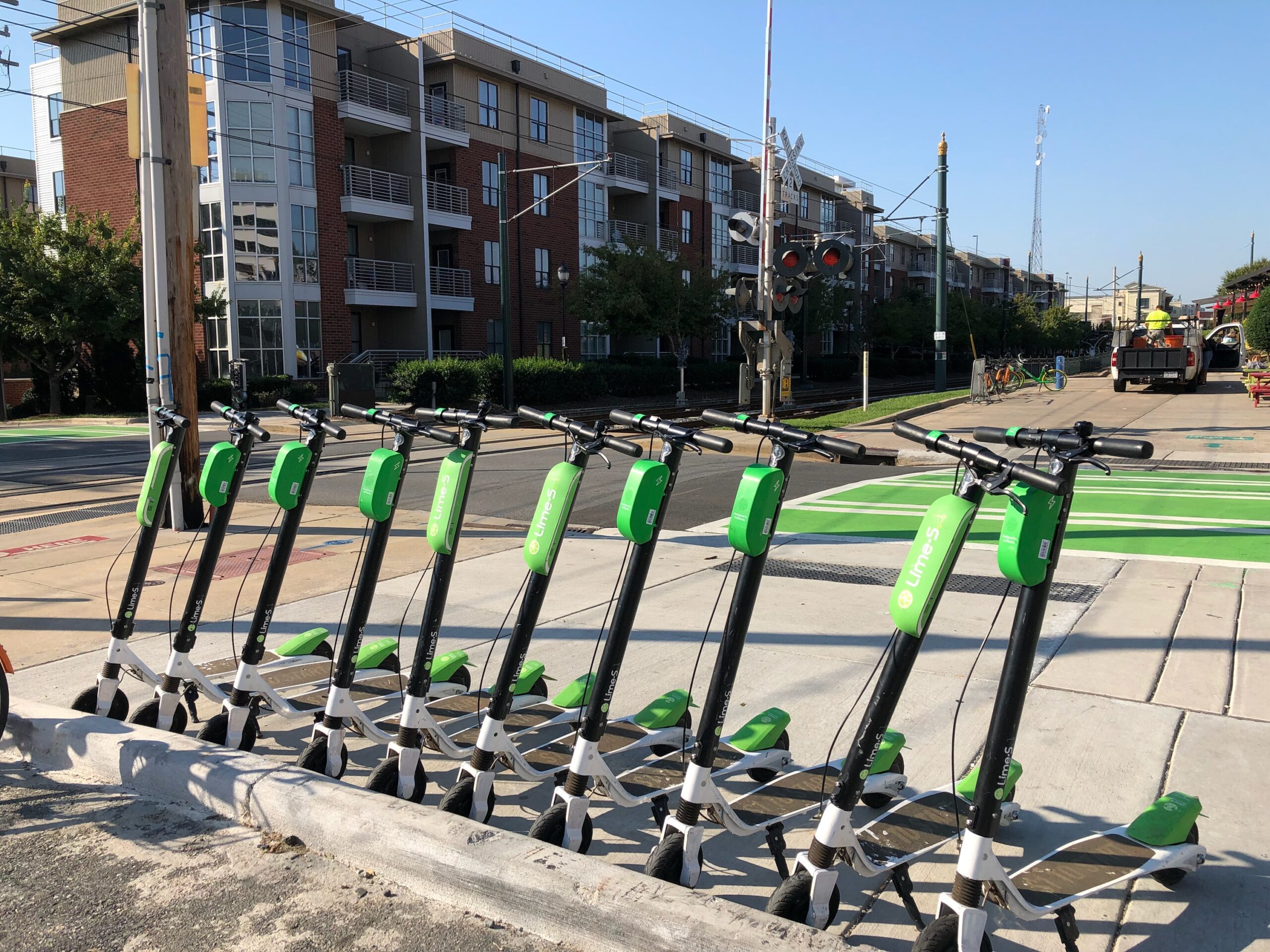I was sitting a few rows away from Durham City Council member Charlie Reece when he recounted his trip to Raleigh to try out the Triangle’s newest transportation fad: It’s not light rail (sorry, Steve), but electric scooters.
He said the experience was “very instructive on both the promise and the peril of these devices,” and then urged the Council to postpone the vote on Durham’s scooter ordinance.
After covering scooters in Charlotte last summer, I couldn’t believe that Durham was joining the many cities stumped by the challenge of regulating scooters.
Companies such as Bird are releasing rental scooters in cities across the United States. Yet, it’s as if each city has to reinvent the wheel by passing its own scooter rules.
And the clock is ticking. Scooter companies have been known to deploy their fleets quickly before cities can enact regulations.
In Charlotte last spring, Lime was ordered to remove its scooters after their release. When Bird descended on Raleigh earlier this summer, lawmakers chose to let them operate while they scrambled to establish rules.
To avoid this Hitchcockian nightmare, Durham must now decide how to best navigate this seemingly lawless landscape. Based on my time writing about and occasionally riding Charlotte’s scooters, I have some suggestions for the city and Durham residents who are likely to see scooters on their streets and sidewalks very soon:
1. Are scooters street legal?
Durham residents gave high marks to the first year of the dockless bike share program. But if there’s any indication that regulating bikes and scooters is getting hairier, it’s the name of the proposed ordinance: Shared Active Transportation.
The euphemism speaks to the complexity of regulating very different types of vehicles.
There’s also debate over whether or not scooters are a good fit for the city’s roads – and how they should be classified.
Under North Carolina law, electric scooters may be considered mopeds, which triggers certain requirements: The scooters must have lights, license plates, and rearview mirrors. Bird and Lime scooters have lights, but not license plates or rearview mirrors.
This makes it seem like either state law needs to change or the scooters need an upgrade.
Some believe the moped designation doesn’t apply to scooters. Shea Denning, professor of public law and government at UNC-Chapel Hill, wrote in a blog post that she doesn’t think the legislature or the Department of Transportation had stand-up scooters in mind when they created definitions for different types of vehicles, including mopeds.
In a statement, the Department of Transportation said, “It is unclear how state laws apply to electric scooters.” The statement also directs people to follow traffic laws and be aware of local ordinances.
Durham’s interpretation is that scooters fall into the moped category, according to Bryan Poole, a transportation planner with the city. So companies will need to show that they meet all of the moped requirements in the state law in order to receive a permit.
“Alternatively, the state law needs to change and/or the DMV needs to issue some type of interim guidance on how to classify electric scooters,” Poole said in an email.
2. Wear a helmet.
Whether they’re fleeing freezing office buildings or dressed up for a night on the town (which, in Charlotte, means brewery hopping), adults riding scooters is a common, though somewhat cringeworthy, sight.
But these two-wheelers aren’t like your beloved childhood Razor scooter; they accelerate quickly, topping out at 15 mph. And while it’s recommended that users wear helmets, few actually do.
Bird will mail a helmet to riders if people request one, but that doesn’t help you if your dinner reservation is in 20 minutes.
Durham’s proposed scooter ordinance does include specific direction on helmets: “Persons operating motorized scooters must be at least 16 years old and wear a helmet.”
If the ordinance passes, then it will be up to law enforcement to hold people accountable for wearing helmets.
California cities from Beverly Hills to San Diego have cracked down on scooter safety. Now, helmetless riders run the risk of getting a ticket and paying hundreds of dollars.
Instead, Durham could partner with local businesses to set out bins with helmets that riders can borrow. People who use and return the helmet could get a discount on their ride. (The idea is to improve safety without increasing ticketing, which often creates a financial burden for low-income members of the community who are intended to benefit from these transportation programs.)
3. Plan for parking.
The influx of dockless bikes turned Durham’s sidewalks into a jungle of discarded Lime and Spin bikes. Scooters may initially bring a similar surge, with people leaving them pretty much everywhere.
Luckily, as more people use the vehicles, they tend to disperse into neighborhoods, freeing up downtown. And Poole said he thinks people will adapt.
“We don’t think about all the cars parked in our downtown, but when we saw 100 bikes, it was all of a sudden a travesty,” Poole said.
However, there’s no question that if vehicles are discarded irresponsibly, they can create serious hazards, especially for people with disabilities.
With scooters coming, too, Durham is considering innovative ways to minimize parking problems. For instance, Poole proposed converting parking spaces for cars into areas designated for shared dockless bikes and scooters.
This could be a great solution. It’s also important to remember that scooters are charged overnight and then neatly parked the next morning, so they shouldn’t pile up.
4. Durham, don’t settle for less.
The scooter ordinance would hike fees for bike and scooter sharing to $100 per scooter, $50 per electric assist bike, and $25 per non-motorized bike.
Last year, the city only charged $10 per bike.
A Bird representative who spoke before the City Council complained that the fee is “one of the higher ones of all the cities we operate in.”
But, let’s face it, dockless bikes and scooters pose plenty of logistical challenges, and Durham should charge a fair price for the additional services it will need to provide. From city officials and police to attorneys and neighborhood improvement services, the bikes and scooters siphon time and resources away from other projects.
The revenue will help pay for administration as well as infrastructure for bikes and scooters, according to Poole.
The ordinance also streamlines data collection for the city. Last year, Durham had trouble obtaining data it requested from bike companies, making it difficult to enforce the requirement that 20 percent of bikes to be in certain census tracts at all times.
When Uber and Lyft debuted across the country, local governments were complacent about regulating the companies. One of the major consequences was that cities didn’t have access to data to help inform decisions about traffic and transportation infrastructure.
This data will help ensure that Durham isn’t in the dark, giving the city the tools to enforce equitable access to bikes and scooters.
5. Looking for a new side hustle?
Last summer, I wrote about people who make money from scooters while they sleep. They pick up scooters at the end of the day, charge them overnight, and return them the next morning.
And they make bank. Some earn $200 a night, for only a few hours of work.
The pay is good if you are able to charge many scooters a night, but as more people sign up to be chargers, the two-wheelers get harder to find.
(Photo by Elizabeth Rennie)
This story has been updated with new information based on a more recent version of the Shared Active Transportation ordinance that will be reviewed at the Durham City’s Council’s work session on October 4.





Comments are closed.